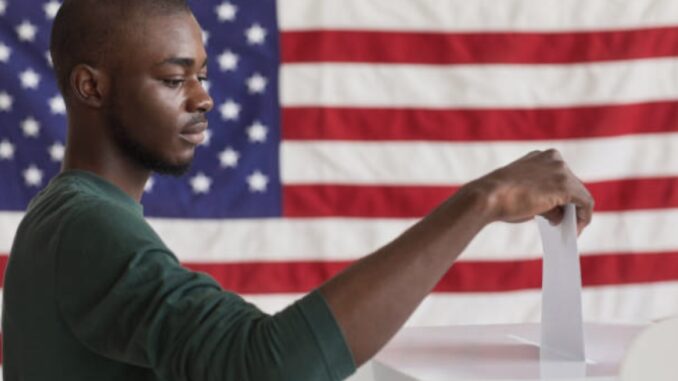
BY KIM GILL
With 19 days left until Election Day, Brooklyn Democrats are working on their final pitch to Black men reluctant to vote this cycle. In East New York, Assemblywoman Nikki Lucas (D-NY) is teaming up with male District Leader Michael Rosendary and Councilwoman Darlene Mealy, hoping to galvanize Black male Brooklyn residents to ensure their voices and concerns are represented in the political discourse. On an October 14 Zoom meeting with local voters, Nikki Lucas stated, “The concern for us is really creating more of an impact for Black men in society.”
With more than 6 million early votes already cast in 39 states, Vice President Kamala Harris and former President Donald Trump battle in the final leg of their race. Harris is making an extra effort to reach Black men who are not yet sold on her campaign through Black media appearances and by releasing a new campaign agenda specifically for Black men.
However, voters had a mixed reaction to comments by former President Barack Obama at a Pittsburgh rally last week, where he criticized Black men for being reluctant to vote for Harris due to gender and shamed them for being willing to vote for Trump. But in Brooklyn, local Democrats are trying to find a different approach to appeal to this demographic. “Where Black men lead, everyone else is sure to follow,” said Councilwoman Darlene Mealy.
On the October 14 Zoom call, Democratic District Leader Michael Rosendary co-hosted the second installment of “Black Men for Politics” with Lucas in an effort to reach Black men in East New York. “We were very intentional to call it Black men in Politics because we know not everyone is pushing for a particular candidate,” stated Lucas. Nearly 20 constituents expressed their concerns and fears going into the election as well as over the potential outcome. Some even voiced their concerns about talking to their neighbors, friends, and relatives who they believe are being fed misinformation. According to East New York resident Mike Tucker, a member of Lay the Guns Down, a foundation dedicated to ending gun violence, “When I talk to people, sometimes I have to walk away from them because I can’t believe the misinformation, and they run with it.”
In an audio town hall on October 15, Vice President Harris reiterated that one of the struggles her campaign is facing is misinformation about her record, mainly about her tenure as San Francisco district attorney. “I’ve had over a 100 arguments with 100 people on this particular reason on why Black men are not voting for the Vice President,” Tucker said. “The first thing they say is that ‘Oh, I’m not voting for her because she was locking brothers up,’ so what I would like to do is invite 1,000 Black men and ask them this important question: If not her, why him?”
“A lot of people talk about Kamala locking brothers up, but they forget that Trump was instrumental in the Central Park Five,” said Roger Mackie, an East New York resident. He was confused as to why Black men were reluctant to vote for Harris yet willing to support Trump. In 1989, after the brutal rape of a New York jogger, Donald Trump took out a full-page ad in all the city’s major newspapers calling for the execution of the Black and Hispanic teens accused. In 2002, all five men were exonerated.
Despite their political beliefs, members of the group were in lockstep about engaging voters from both sides of the political aisle. They even encouraged participants leaning towards Trump to engage in the conversation, although none did. All participants also agreed that the link between Black voters and disengagement was election misinformation. Frankson asked, “How do we engage Black men, equip members of our vote, and combat the disinformation?”
Assemblywoman Lucas proposed creating a fact sheet or report card about the candidates to combat the misinformation out there. In addition to the fact sheet, Frankson suggested going to the local barbershops – culturally a hub for Black men – and talking to the owners and patrons. Then Lucas suggested what she calls a “lifestyle tour” where community leaders and elected officials can canvass the area and go to different barbershops to talk to people, but emphasized that the factual information be provided in small doses and that the messaging be conveyed through empathy and understanding. She stated, “We want people who are registered to vote to go out and vote and vote on the issues based on fact and not fiction.”
Lucas will head the lifestyle tour, which will meet at her campaign office and kick off on Saturday, October 19th, 2024, in East New York. The tours will continue throughout the remainder of the year beyond the 2024 election. Lucas, Rosendary, Mealy, and other community organizers hope that this initiative has a ripple effect on Black male engagement in politics.
